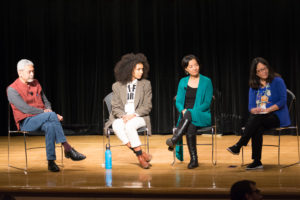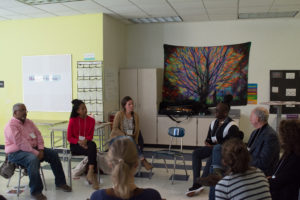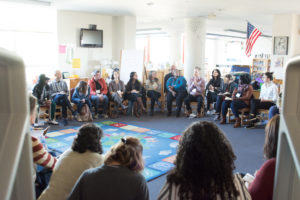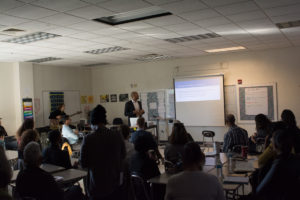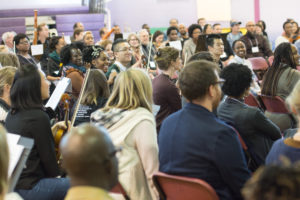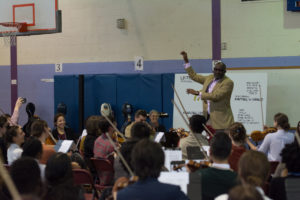Every now and then it’s important to recommit to why I’m in public education and why I continue to feel hopeful even in such dark times. Yes, funding for public schools continues to be a struggle, particularly for urban schools. After 25 years of high stakes testing, we know how dissect students’ test results to a decimal point and we can measure and compare our young people and their schools based on test scores. We can talk about student growth percentiles; we can disaggregate scores based on race as well as socio-economics status. We show how students perform who have an individualized education plan or special needs or are English Language Learners. We can do so much with data today. However, with all the money and time spent on testing and test prep, we have not created too many more schools that I’m proud to say, “Yes! That’s what our kids need in today’s world!”
However last month, the Center for Artistry and Scholarship hosted a series of events that remind me why I stay in the work, why I’m proud and, why I’m hopeful.
Next Wave was a day-long event on Saturday October 19th at Orchard Gardens K-8 Pilot School. I’m enormously proud of this school—not 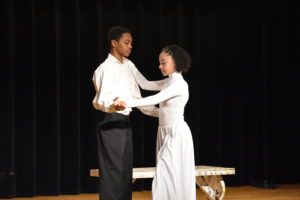 because of their test scores (which are low) but because of the kind of inspired teaching and learning that occurs every day here with these 1,000 three through 14 year old young people. The school is brimming with excitement as students spend time learning in both academics and the arts. The faculty includes at least ten visual art, music, dance, and theatre teachers, and high-level arts instruction has consistently been part of the Orchard Garden success story. The students, like those in many in Boston Public Schools, represent over 20 different countries and languages. In fact, 70% are learning English and will be fully bilingual when they graduate. 90% are considered “high need” which means that they have barriers to academic achievement either because of special needs, poverty or language background. There are dozens of community-based organizations that partner with the school. Parents and family members are active participants in school life and in the governance of the school. It was the perfect school in which to showcase innovation.
because of their test scores (which are low) but because of the kind of inspired teaching and learning that occurs every day here with these 1,000 three through 14 year old young people. The school is brimming with excitement as students spend time learning in both academics and the arts. The faculty includes at least ten visual art, music, dance, and theatre teachers, and high-level arts instruction has consistently been part of the Orchard Garden success story. The students, like those in many in Boston Public Schools, represent over 20 different countries and languages. In fact, 70% are learning English and will be fully bilingual when they graduate. 90% are considered “high need” which means that they have barriers to academic achievement either because of special needs, poverty or language background. There are dozens of community-based organizations that partner with the school. Parents and family members are active participants in school life and in the governance of the school. It was the perfect school in which to showcase innovation.
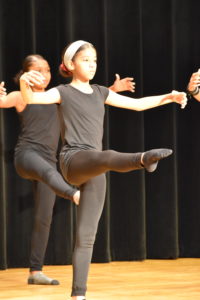 The day began with Orchard Garden middle schoolers presenting a rehearsal of “Romeo and Juliet” which included original choreography. (Spoiler alert: the dance teacher is a Boston Arts Academy alum, so I was grinning from ear to ear!) Following that delightful and intimate look into how young people develop artistic skills, another group of students demonstrated how they begin their dance class with intricate footwork and technique exercises.
The day began with Orchard Garden middle schoolers presenting a rehearsal of “Romeo and Juliet” which included original choreography. (Spoiler alert: the dance teacher is a Boston Arts Academy alum, so I was grinning from ear to ear!) Following that delightful and intimate look into how young people develop artistic skills, another group of students demonstrated how they begin their dance class with intricate footwork and technique exercises.
Next, a group of 2nd graders from Conservatory Lab Charter School took the stage. Their teachers, Josh Garver, Alex Ramos, and William Lynch led these eight-year old children (and one 4th grader) through exercises that reflected 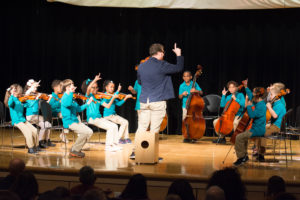 their music educational journey from pre-k through second grade. Josh explained that from the first moment the Resident Artists (music teachers) meet the students they refer to them as musicians and artists. The first two years are spent learning about voice (singing), movement and working in a group. In kindergarten students learn how to take care of an instrument and by 1st grade students are ready to become a string orchestra. By 2nd grade students are ready for improvisation and even composition. Students closed out this session with “We Will Rock you,” and audience members were just enthralled with the level of professionalism and expertise that these young musicians demonstrated.
their music educational journey from pre-k through second grade. Josh explained that from the first moment the Resident Artists (music teachers) meet the students they refer to them as musicians and artists. The first two years are spent learning about voice (singing), movement and working in a group. In kindergarten students learn how to take care of an instrument and by 1st grade students are ready to become a string orchestra. By 2nd grade students are ready for improvisation and even composition. Students closed out this session with “We Will Rock you,” and audience members were just enthralled with the level of professionalism and expertise that these young musicians demonstrated.
After the students left the stage, Lisa Wong, pediatrician and musician, moderated a panel with Esperanza Spalding, Shaw Pong Liu and Vikram Patel. Lisa asked how what we just experienced about arts teaching and learning made visible might help shift the conversations we have in education today?
The panelists shared their reactions and entry points as doctors, musicians, scholars, activists. Shaw Pong talked about the very language we use. “The possibility of educating artists instead of students/citizens…if you look at an artistic mentality, it’s a mindset driven by passion of creation – that is the energy can transform communities. Esperanza Spalding went further and described how “music is the coagulant. It holds the space together.” Spalding said that she believes in the “power that music has to soothe and enable confidence to move forward.” Vikram, the non-musician in the group asked this: “Often the question is posed, ‘should we invest in music because ultimately the goal is a better economic outcome?’ But is that the right question? Or, is it about becoming a better human being?” There was consensus that music helps us become better human beings and that engaging in music is different than engaging in verbal discussion. The range of skills being practiced in musical dialogue may help young people more deeply understand collaboration and even critical thinking. Certainly, music making can help teach compassion, creativity and ways to communicate. Those “5 C’s,” as I like to call them, are the very same qualities we say are in short supply in our schools and in the workforce.
After this immersive opening session featuring young people and then experts, participants left for various workshops. Topics included music and dialogue for healing, executive functioning, and designing anti-racist schools. I was enormously proud since over 50% of the workshops were from PSi alums, and many of the workshops included students. A common thread throughout the day focused on how to foster democratic practices and creative approaches to racial and social justice.
The closing activity for Next Wave was called “Listening to Lead.” Aithan Shapira brilliantly facilitated along with a 60-person orchestra. The 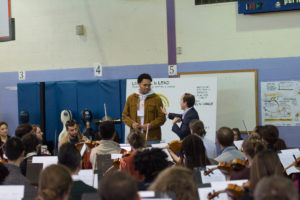 musicians had set up in the gym and each musician had an empty seat next to her or him. We, the participants, took those seats. Aithan and the conductor led us for 90 minutes and we experienced the themes of the workshop, which were:
musicians had set up in the gym and each musician had an empty seat next to her or him. We, the participants, took those seats. Aithan and the conductor led us for 90 minutes and we experienced the themes of the workshop, which were:
- listening to lead,
- managing complexity, and
- sense make through collaboration
I would never have thought it possible to think so deeply about leadership through listening to an orchestra, but as one of my colleagues said, “That was the most beautiful and cathartic experience I have had in a long time. As a leader, it is very rare that I have the chance to close my eyes and think about about what I’m doing in such a different way. That was a powerful gift. I came feeling so empty. I am leaving feeling so filled and hopeful.”
Another colleague shared this observation with me: “At first I thought: “how much of this can I really pick out? I’m not an expert orchestral listener. And, yet his lessons, I was still able to tune into…I think that was important because there I was underestimating myself as a listener, underestimating myself as a learner for his lessons, and thinking about the ways in which our students may do the same, in the classroom. Our teachers really need to push our students to not think of themselves this way, [and for teachers to] not think of our students that way, to really overcome those deficit models.”
And another powerful comment on the entire day: “It reminded me that it all starts with the adults. We cannot create anti-racist practices and structures unless the teachers have gone through a lot of thoughtful reflection on their own – on my own – identity and relationship with whiteness and white supremacy and racism in the system. Unless I as a teacher have done extensive work on that, I cannot begin to introduce it to my students. So reminding myself of that and not being too quick to implement something when I’m not fully ready to, that was a big takeaway.”
I’ve said that Next Wave felt like my second wedding because so many people I love and admire came and shared their insights and knowledge. As my colleague Tony Simmons said, “It just validates the fact that community is still extremely, extremely important. We don’t change anything if we don’t come together… out of our islands [or siloes]. We have to be intentional about bringing people together.. I am re-ignited with a sense of common purpose so we can accomplish big things.”
Another teacher said that she loved the workshop from Elizabeth Schibuk, middle school teacher from Conservatory Lab and her recently graduated students, on 8th grade Capstone Projects. “What I loved was that all the students were now in 9th grade and came back to present. It was an entire class focused on social justice, art, activism and leadership. That speaks to ways of decolonizing curriculum, and allowing scholars to see themselves with pride and agency.” Another teacher commented on the power of the Boston Arts Academy workshop that included as students and teachers as co-presenters.
For me, one of the most exciting aspects of Next Wave was welcoming back “the Finns.” A few years back, Sitra, the Finnish think tank, convened a group of American and Finnish educators and academics to write about sustainability and the future of learning and work. (Sustainability, Human Well-Being, and the Future of Education ed. Justin W. Cook. I am privileged to have a chapter in the book). At their seminar, once again, the Finns shared their ideas about what makes good schools. First of all, they emphasize learning through observation and working together. They deeply believe in both bottom up and top down collaboration and start with the question of what kind of competencies do our young people need for the future. And they actually ask young people this question along with parents and of course teachers. That is how they revise and reform their curriculum – every 10 years. Why do they revise ever decade or so? Because it’s a changing world and the science of learning changes. They talk about empathy and courage and also coherence. “Subjects are material for understand the world today,” Irmeli, one of the presenters told us. But most importance is the sense of coherence which includes the idea of having meaningful learning experiences. “This is the task of the school—for young people to feel respected and loved and to find the joy of learning and the motivation to learn.” That is how they define student agency. Hanna, a principal who run a K-9 school talked about the emphasis on learning by doing and how important drama, art, music dance, literature, physical education, and handicrafts are to education. “We work to have an IEP for every kid since every kid is an individual. But the most important thing is safety: emotional, physical and intellectual.” Hanna describes how her teachers start with the question: What do children need from us? Then, as teachers, we figure out how to give that. It was so inspiring to hear them talk about their experiences.
Words like evaluation and accountability are rarely used in Finnish educational context. “We learn through talking and getting better.” And the idea of cooperation far outweighs competition.
There was so much to learn from our Finnish colleagues, and I was so happy that they could be part of Next Wave. In so many ways, they represent where we need to go!
Angie Uyham, who teaches with PSi and runs the Cambridge Educators Design Lab summed up the day best: “I think it was incredible to have so many creative, thoughtful artists and educators together. The energy, the vibe of innovating and thinking about how we could collaborate to create a path for change was just so tangible and I can’t wait to connect with a lot of the people I met today to really make it happen.”
Next Wave will keep on rolling!

